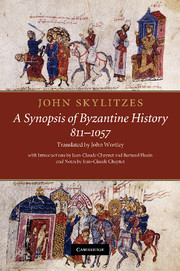Book contents
- Frontmatter
- Contents
- The English translator’s Preface
- Introduction
- Re-writing history: John Skylitzes’ Synopsis historion
- Foreword
- Chapter 1 Michael I Rangabe, the Kouropalates [811–813]
- Chapter 2 Leo V the Armenian [813–820]
- Chapter 3 Michael II the Stammerer [820–829]
- Chapter 4 Theophilos [829–842]
- Chapter 5 Michael III, the son of Theophilos [842–867], and his mother Theodora [842–862]
- Chapter 6 Basil I Kephalas, the Macedonian [867–886]
- Chapter 7 Leo VI the Philosopher (the Wise) [886–912]
- Chapter 8 Alexander [912–913]
- Chapter 9 Constantine VII, Porphyrogennetos [913–959]
- Chapter 10 Romanos I Lekapenos [919–944]
- Chapter 11 Constantine VII [944–959]
- Chapter 12 Romanos II the Younger [959–963]
- Chapter 13 Basil II Bulgaroktonos and Constantine VIII [976–1025]
- Chapter 14 Nikephoros II Phokas [963–969]
- Chapter 15 John I Tzimiskes [969–976]
- Chapter 16 Basil II and Constantine VIII bis [976–1025]
- Chapter 17 Constantine VIII [1025–1028]
- Chapter 18 Romanos III Argyros [1028–1034]
- Chapter 19 Michael IV the Paphlagonian [1034–1041]
- Chapter 20 Michael V Kalaphates [1041–1042]
- Chapter 21 Constantine IX Monomachos [1042–1055]
- Chapter 22 Theodora [1055–1056]
- Chapter 23 Michael VI the Elder/Stratiotikos [1056–1057]
- Glossary
- Bibliography
- Index
- References
Chapter 19 - Michael IV the Paphlagonian [1034–1041]
Published online by Cambridge University Press: 05 July 2014
- Frontmatter
- Contents
- The English translator’s Preface
- Introduction
- Re-writing history: John Skylitzes’ Synopsis historion
- Foreword
- Chapter 1 Michael I Rangabe, the Kouropalates [811–813]
- Chapter 2 Leo V the Armenian [813–820]
- Chapter 3 Michael II the Stammerer [820–829]
- Chapter 4 Theophilos [829–842]
- Chapter 5 Michael III, the son of Theophilos [842–867], and his mother Theodora [842–862]
- Chapter 6 Basil I Kephalas, the Macedonian [867–886]
- Chapter 7 Leo VI the Philosopher (the Wise) [886–912]
- Chapter 8 Alexander [912–913]
- Chapter 9 Constantine VII, Porphyrogennetos [913–959]
- Chapter 10 Romanos I Lekapenos [919–944]
- Chapter 11 Constantine VII [944–959]
- Chapter 12 Romanos II the Younger [959–963]
- Chapter 13 Basil II Bulgaroktonos and Constantine VIII [976–1025]
- Chapter 14 Nikephoros II Phokas [963–969]
- Chapter 15 John I Tzimiskes [969–976]
- Chapter 16 Basil II and Constantine VIII bis [976–1025]
- Chapter 17 Constantine VIII [1025–1028]
- Chapter 18 Romanos III Argyros [1028–1034]
- Chapter 19 Michael IV the Paphlagonian [1034–1041]
- Chapter 20 Michael V Kalaphates [1041–1042]
- Chapter 21 Constantine IX Monomachos [1042–1055]
- Chapter 22 Theodora [1055–1056]
- Chapter 23 Michael VI the Elder/Stratiotikos [1056–1057]
- Glossary
- Bibliography
- Index
- References
Summary
After the emperor Romanos had been exterminated in the way we just described he was interred on that same Good Friday in the Peribleptos monastery which had recently been constructed by him.
Zoe thought that, once she had established Michael on the imperial throne, she would have a slave and servant rather than a husband and an emperor. She had already moved her father’s eunuchs into the palace and was taking a closer interest in state affairs but, in the event, everything turned out for her in a strikingly different way. John [the Orphanotrophos], the emperor’s brother, was an energetic man of action. He was concerned for his brother’s safety from when he first set foot in the palace, for he had the example of Romanos [III] before his eyes. He expelled the empress’ eunuchs from the palace and packed off the most faithful of her servants, appointing women who were related to him to be her warders and guardians. There was nothing that she could do, great or small, without his permission. She could neither go for a walk nor visit the baths unless he gave assent; he deprived her of all recreation.
When he had dealt with all aspects of the palace situation, he sent letters throughout the inhabited world making it known to all that the emperor Romanos had paid the debt of his mortality; also that Michael, having been proclaimed while Romanos was still alive and with his approval, was now married to the empress. Everybody else willingly accepted this and acclaimed the new emperor with the voice of praise; [393] only the patrician Constantine Dalassenos (who was residing on his estate) did not take kindly to the news. He could scarcely endure what they were saying and wondered aloud why, when there were so many excellent men of distinguished families and noble birth, a vulgar threepence-a-day man should be preferred above all others and be proclaimed emperor.
- Type
- Chapter
- Information
- John Skylitzes: A Synopsis of Byzantine History, 811–1057Translation and Notes, pp. 370 - 390Publisher: Cambridge University PressPrint publication year: 2010

